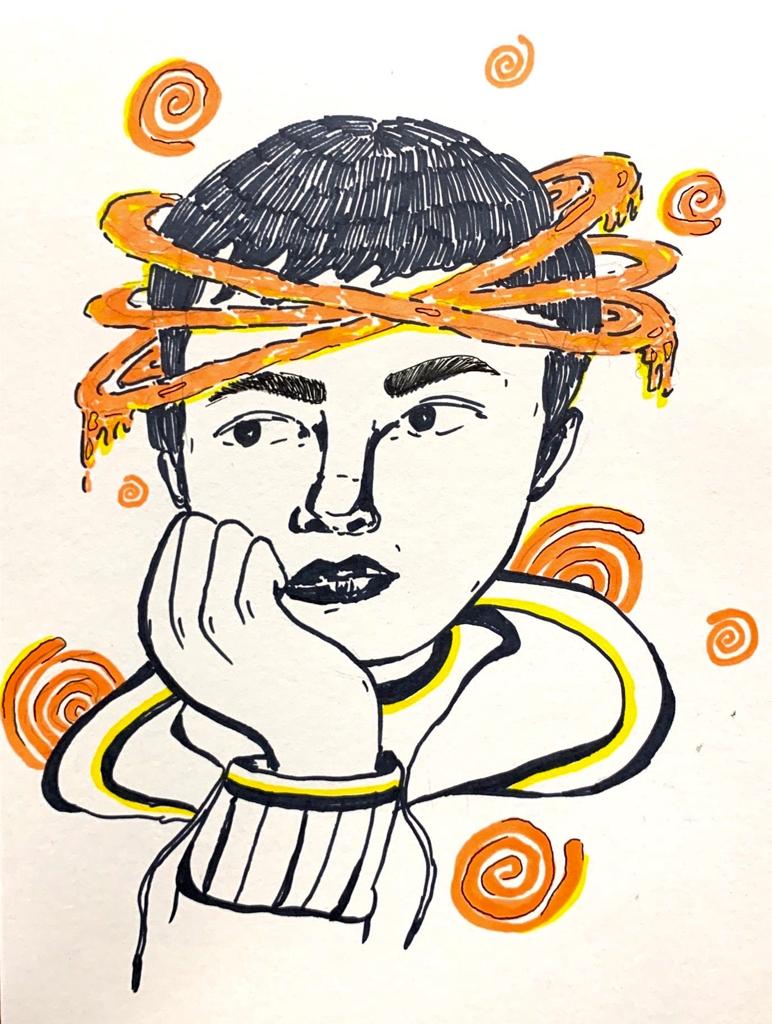With Love to Ashoka: Friendliness, Food Poisoning, and Freedom
Cecilia Costa Da Luz, Class of 2021 I procrastinated writing this essay way too many times

Vidit Singh, Undergraduate Class of 2022
My body battles the sharp chill of the wind that doesn’t seem to come or go but exists everywhere around you. It’s well past 12 a.m. and there’s a sweet comfort in the melancholia around the air. My feet, battered with the haunting chill, find themselves at the Dhaba where I intend to nibble away and put my rather hungry stomach to peace.
“I want my chai in the glass,” I say to Kuldeep bhaiyya at the counter. All I wanted was to resort to the inducted glass that would provide heat to my body and ice to my thoughts that curse me for not bringing my hoodie. All the tables are occupied and I resort to sitting with a kind acquaintance. He’s with a friend from class.
On the table lie dirty plates that once held hot paranthas smothered with rich makkhan-chutney, a few dribbles of water from the slippery jug, and fingers dripping with rabdi as they delve into the pool of glowing hot, tangy orange, pulpy Jalebis.
Jalebis: the single most irresistible sight on the face of this earth — it’s a treat to the eyes, to the nose and to the tongue. And they truly transcend the limits of a savoury treat; something I will learn as my conversations with these two individuals proceed.
And as it takes its due course, I too wrestle my fingers into one of those orange curls — to nibble of course. The chai enters this stage as well. It steams as I lose myself into the conversation about childhood with the mates; funnily, jalebi finds itself in those faint memories too.
2006| Itaunja, Uttar Pradesh
“I was born in that old house of mine. I still remember the black and white tiles on the verandah that would overlook the barley fields of my family. Our family had always been joint and it still is to this day. But after the death of my grandmother, the old house had to — it had to be renovated. By the time it was being torn brick by brick and then being built brick by brick, our family had to find nuclear settlements. I, along with my elder brother and parents, moved to a modest apartment in Paswan Gully. Paswan gully was the hotspot for the mohalla to come to for their shopping. Along with the basic ration shops, it had understated glittery parlours that sold the cheapest shararas in town. But at the end of Paswan gully, near my school bus stop, was a sweet shop that in my humble opinion sold the best jalebis in Itaunja. It was owned by a Sardarji who I referred to as just ‘Uncle ji.’ I never got around to knowing his real name. I don’t even know for sure if he was the owner, the manager, or the head halwai, but he was my point of contact for all of 2 years during my time at Paswan gully. Thrice a day every week, I’d walk home with a generous serving of small jalebis. Sardarji always welcomed my presence. Every time I smell jalebi it takes me back to Paswan Gully: the smell of our cozy home, the sweet shop that once was, and the Sardarji who now rests in peace.”

2015| New Delhi
“Tenth grade was a harrowing time in my life and, funnily enough, I never felt its wrath. I was grappling with a sheet in which I had to fill in my stream preferences. My parents left the decision on me; I knew they could’ve easily demanded science and I would’ve opted that. Before that, however, I had my final exams to get through. The system in my school placed the subject preferences in a hierarchy: highest scorers get science and lowest scorers get humanities. I enrolled myself in 3 different tuitions of 3 subjects each to get the highest score possible so I could get the security of choosing whatever I wanted. The constant to and fro of those sessions in tuition classes in Rajinder Nagar sucked the life out of me. But my Math tutor, easily the most eccentric out of the lot, made studying — and life — a little easier. One day he took me to Aggarwal’s sweet shop nearby for a session. It was the 7 of us who had come to him asking for doubts, and for some reason best known to him, he decided to treat us. When I said that I’d make do with a Shahi Tukda, he dismissed it and said that both of us are going to share a plate of jalebis. Little did I know that he had already glanced at my paper and figured I had problems with the chapters of “circles.” As he took jalebis piece by piece, he rewired the whole concept in my mind. And if it weren’t for jalebis, I probably would have taken arts out of coercion.”
Their stories had chewed away my desire to nibble. My chai was still half full. On the table lay an additional empty plate that once held garlic naan. I marinated in the warmth of my chai, in the warmth of their jalebi, and in the warmth of their memories.
The author is a Staff Writer for The Arts and Culture Section of The Edict.